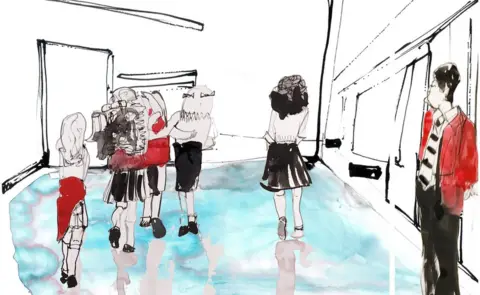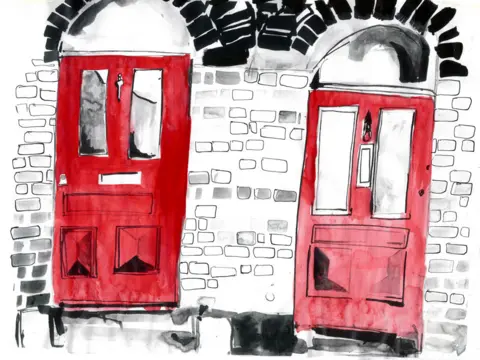'He hid in a cupboard - we just couldn't get him to school'
 BBC
BBCThe pressures of school life can be tough for a lot of kids, but for a child who's experienced abuse, neglect and years in care, the strain can be even greater.
When Evelyn and Tony adopted Ryan at the age of seven, his special educational needs were not immediately apparent.
Ryan is smart, bright and eager to please - every teacher's dream. But the trauma of his early years meant the day-to-day expectations of mainstream school were too much for him.
Evelyn: Ryan came to us with a history of abuse and neglect - domestic violence, drugs and alcohol, not getting enough food, inadequate clothing, extremely poor hygiene - but nothing actually diagnosed as being any particular special need.
He used to hide a lot when we first had him, so if you even very slightly raised your voice, or there was even a slight sign of disapproval - the slightest - he would hide behind a curtain or under the bed and shake and ask you if you were going to hit him.
He'd been in multiple schools before he came to us and when he came to us we were advised that he only went in for a couple of hours per day for the first few weeks.
I think he did very well with that. He integrated in the beginning very well because the pressure isn't so much in Year 2 and in Year 3. He coped quite well then.
Tony: It was more Year 5 and 6. That's when it really started to hit. He found it more of a struggle, the work was harder and he couldn't cope with it.
When he was in Year 6 we stopped all homework because when we tried to do homework with him he couldn't cope with it. He threatened to self-harm and to harm us, as well.
Evelyn: Especially then with Sats tests in Year 6. The anxiety got worse and worse. His sleep became much worse, he became much more anxious. He started not being able to go in in the morning, feeling really sick. There were days when we couldn't get him in to school. It was dreadfully stressful.
Tony: Plus he wouldn't sleep very well, so we were trying to help him to sleep. We were often up 'til one or two in the morning. Both ends of the day were a problem.
Evelyn: We repeatedly asked the primary school to have an educational psychologist come in and make an assessment and we were constantly told: "No, there's not enough need. He's intelligent". So we got absolutely nowhere.
The subsequent move to a comprehensive school proved highly stressful for Ryan and, after a term and a half, he dropped out.
Evelyn: The Senco (special educational needs co-ordinator) seemed not to have much experience around trauma and attachment issues.
When he met Ryan on the first day, we felt as if he was suggesting that we were lying, because he didn't outwardly appear to be anxious and he was very good at trying to fit in and looked good, looked smart and didn't look like a child with special needs.
Unfortunately because they didn't adequately understand him - because it is mainstream education - they couldn't provide for his needs.
Tony: Things slowly got worse and worse and he started school-refusing. We tried all sorts of things to help him and talked to the teachers.
That worked for a little bit, but eventually he just couldn't cope. He couldn't cope with the large classrooms, he couldn't cope with certain teachers, any teacher that shouted, and eventually he just hid in a cupboard for a couple of days and wouldn't come out. We just couldn't get him to school.
Evelyn: And when he wasn't in school anymore, he became quite agoraphobic, he became very isolated and his mental health was even worse because he wasn't in any form of education.
Desperate for help, Evelyn and Tony turned to the adoption agency Family Futures and to a specialist children's hospital. These organisations assessed Ryan and reported that he did have specific needs.
Evelyn: The Family Futures report came out telling us that Ryan had developmental trauma, sensory modulation difficulty, generalised anxiety disorder and post-traumatic stress disorder.
We also went to the attachment and trauma team at the children's hospital and they did assessments, as well. So between the two places, that was the diagnosis and this gave us all the evidence we needed for getting our EHCP [education, health and care plan], which we triggered ourselves.
Tony: Luckily we got that EHCP and that helped us secure Ryan's education - to go to a special needs school.
Evelyn: But none of the schools in our local authority [area] met his needs. We were then advised that we'd have to look beyond our own borough to try and find something. So we searched the internet and we found a local therapeutic provision for education. He was offered a place and started this September.
His new school is much smaller, with much smaller classes. It's individually tailored to each child's needs and there's much more encouragement. It's about building him up, meeting his needs - it's not about getting him nine GCSEs; it's about trying to help him survive.

For two weeks he went part-time. He's full-time now and he loves it. In fact, tonight he said to me: "Thank you for fighting for me. If I ever win the Oscars, I'll get you on stage to celebrate with me."
In spite of their battles, Evelyn and Tony have no regrets, but wish the authorities were more honest with, and supportive of, adoptive families.
Evelyn: We've had a lot of people in education look at Ryan and say: "But there's nothing wrong with him, he looks completely normal." And I think that, as adopters, when we adopted him, we thought exactly the same.
I don't think that we had any idea that he had this level of special need and when you finally get these diagnoses, in some ways it's quite shocking. It's quite a relief but it's also a shock because you do feel they did know or they could have really guessed that there would be some degree of need in this way - but they don't tell you and it would really help if you did know.
Tony: It would be much better if the authorities were able to give a lot more help, because without so much of a battle it would be great. Sometimes it is just really hard work and it seems like you're constantly having a wall to climb each time to get help, which there really shouldn't be.
We don't have any regrets at all. To anyone who's thinking about adopting I'd say you've got to go in with your eyes open, getting as much information as you can and realising that lots of the children that get adopted will have special needs in some way, or need extra help in their life, and that's a battle sometimes - but it's worth it.
All names have been changed. Produced by Katherine Sellgren, BBC News family and education reporter
